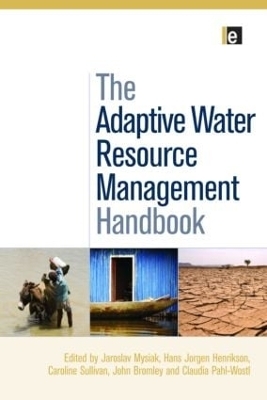
The Adaptive Water Resource Management Handbook
Earthscan Ltd (Verlag)
978-1-84407-792-2 (ISBN)
- Titel z.Zt. nicht lieferbar
- Versandkostenfrei innerhalb Deutschlands
- Auch auf Rechnung
- Verfügbarkeit in der Filiale vor Ort prüfen
- Artikel merken
The complexity of current water resource management poses many challenges. Water managers need to solve a range of interrelated water dilemmas, such as balancing water quantity and quality, flooding, drought, maintaining biodiversity and ecological functions and services, in a context where human beliefs, actions and values play a central role. Furthermore, the growing uncertainties of global climate change and the long term implications of management actions make the problems even more difficult.
This book explains the benefits, outcomes and lessons learned from adaptive water management (AWM). In essence AWM is a way of responding to uncertainty by designing policy measures which are provisional and incremental, subject to subsequent modification in response to environmental change and other variables. Included are illustrative case studies from seven river basins from across Europe, West Asia and Africa: the Elbe, Rhine, Guadiana, Tisza, Orange, Nile and Amudarya. These exemplify the key challenges of adaptive water management, especially when rivers cross national boundaries, creating additional problems of governance.
Jaroslav Mysiak is Senior Researcher at the Fondazione Eni Enrico Mattei, and a lecturer at the Department of Economics, University Ca'Foscari in Venice, Italy. Caludia Pahl-Wostl is Professor of Management of Resource Flows at the Institute for Environmental Systems Research in Osnabruck, Germany. Caroline Sullivan is an environmental economist and is currently Group Leader of the Water Management and Policy Group at the Oxford University Centre for the Environment, UK. John Bromley is a hydrogeologist and a Senior Research Fellow at the Oxford University Centre for Water Research, UK. Hans Jürgen Henriksen is Senior Advisor in Hydrology at the Geological Survey of Denmark and Greenland, GEUS, Copenhagen, Denmark. Based on extensive collaborative research from the NeWater (New Approaches to Adaptive Water Management Under Uncertainty) project.
1. Introduction - Making a Strong Case for AWM
2. Working Towards AWM
3. Tools and Instruments for Adaptive Management
4. AWM - Training, Capacity Building and Knowledge Transfer
5. Case Study : Elbe
6. Case Study : Guadiana
7. Case Study : Rhine
8. Case Study : Tisza
9. Case Study : Amudarya
10. Case Study : Nile
11. Case Study : Orange
12. Summary and Outlook
| Erscheint lt. Verlag | 11.11.2009 |
|---|---|
| Verlagsort | London |
| Sprache | englisch |
| Maße | 156 x 234 mm |
| Gewicht | 472 g |
| Themenwelt | Naturwissenschaften ► Biologie ► Ökologie / Naturschutz |
| Technik ► Umwelttechnik / Biotechnologie | |
| ISBN-10 | 1-84407-792-6 / 1844077926 |
| ISBN-13 | 978-1-84407-792-2 / 9781844077922 |
| Zustand | Neuware |
| Haben Sie eine Frage zum Produkt? |
aus dem Bereich


